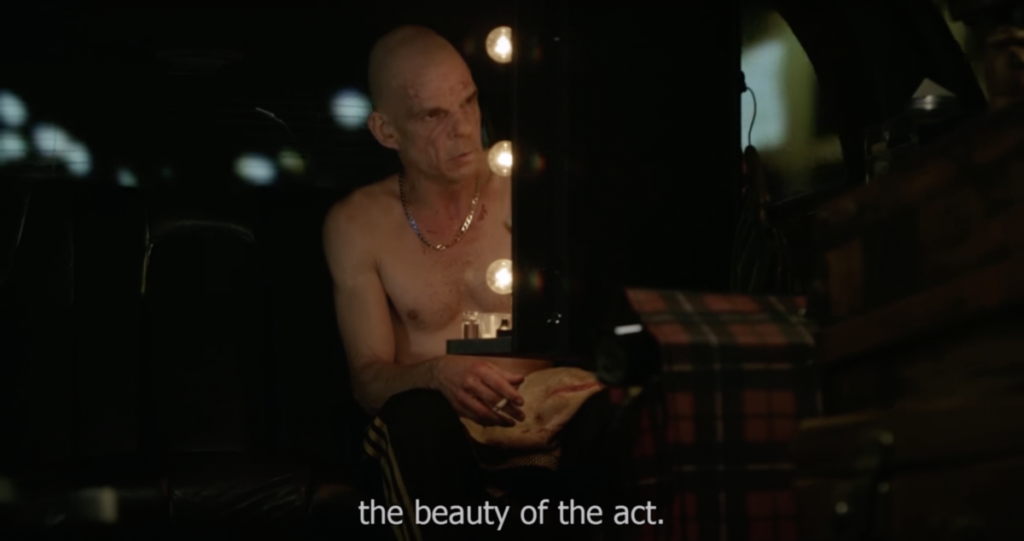In the film Holy Motors, we follow Mr Oscar as he travels around Paris in a limousine. He is a mysterious man with a unique job that requires him to transform into different characters and personas for various “appointments” throughout the day. The lines between performance and reality are blurred as he embodies these identities and travels through a succession of bizarre and seemingly unconnected situations. As Mr Oscar follows through with his appointments, the distinction between acting and living becomes increasingly ambiguous. This reflects the idea that in modern society, we often adopt different personas in various aspects of our lives, whether at work, home or in social situations. Holy Motors questions how real these roles are in comparison to who we consider to be our true selves.

Additionally, the film reveals very little about Oscar’s true identity. When asked, “What makes you carry on?” Oscar responds with “The beauty of the act”. This lets us know that Oscar’s passion in life is acting. However, because he is always impersonating a different character, we know very little about who Oscar really is apart from performing. This makes us wonder, who really is Oscar? Is he even happy? What happens when you have no sense of self? More so, we can see that it is getting more difficult for Oscar to continue his appointments. He points out that the cameras are getting smaller and more visible making his job harder.
In the film, Céline plays a big role in keeping Oscar in a good place. She constantly reminds him of his next appointments, to eat, to take care of his health, and to laugh. This shows how demanding Oscar’s job is because he emerges himself into character so deeply that basic needs become forgettable. However, Céline helps him and plays somewhat of a mother role in the essence that she takes care of him.
Amy, I agree with your take on blurring the lines of acting and authenticity in “Holy Motors.” As we put on different “performances based on the environment we are in, it gets harder and harder to know your authentic self. The fact that the film goes from appointment to appointment, barely revealing details about Oscar’s life, shows how Oscar views his life. His life is revolved around acting, making it hard for Oscar to identify with his true self or to acknowledge himself as something other than an actor.
Amy, the questions you raise that the film makes us ask are valid considerations. On your point regarding the distinction between acting and living becoming increasingly ambiguous, the film seems to give us more clues as to what exactly it is hinting at. In the same conversation you quote wherein Oscar communicates with a man who may be Oscar’s Boss, the man states that “Thugs don’t need to see security cameras to believe in them.” When challenged by Oscar (“Are you trying to make us all paranoid?”), the man hardly retorts the question, saying “Aren’t you already?”. As avant-garde films seldom avoid meta-commentary on the film industry itself, Holy Motors could be seen as a commentary on the wider ability of people to film things in general, with people both knowing that they are being recorded in many formal senses and simultaneously it not being unreasonable for both teenagers and adults to worry about being recorded in school or work, making us all paranoid. Your point of blurring the line between acting and reality is illustrated by how in Holy Motors, keeping the cameras out of the film, Holy Motors makes a commentary on the ever-presence of filming.
I think this is a very interesting way of looking at this narrative. If we look at life from a third-person perspective, we observe that we behave like completely different persons around different people. It is as if we are all playing characters in a play and with every single person, we act as if we are completely different characters.
I think the director tells about how from the moment we wake up, we are in a movie or a play one might say and we are all just playing characters trying to fit into the narrative. This can be understood from the first scene of the movie when Mr. Oscar wakes up in his room and opens the door to a movie theatre. I think that was a beautiful description of our lives in the 21st century.
We also try to hurt each other and ourselves by playing different characters and pretending that it is just business as usual. This is the mask we wear to not face reality and keep ignoring what makes us ahppy